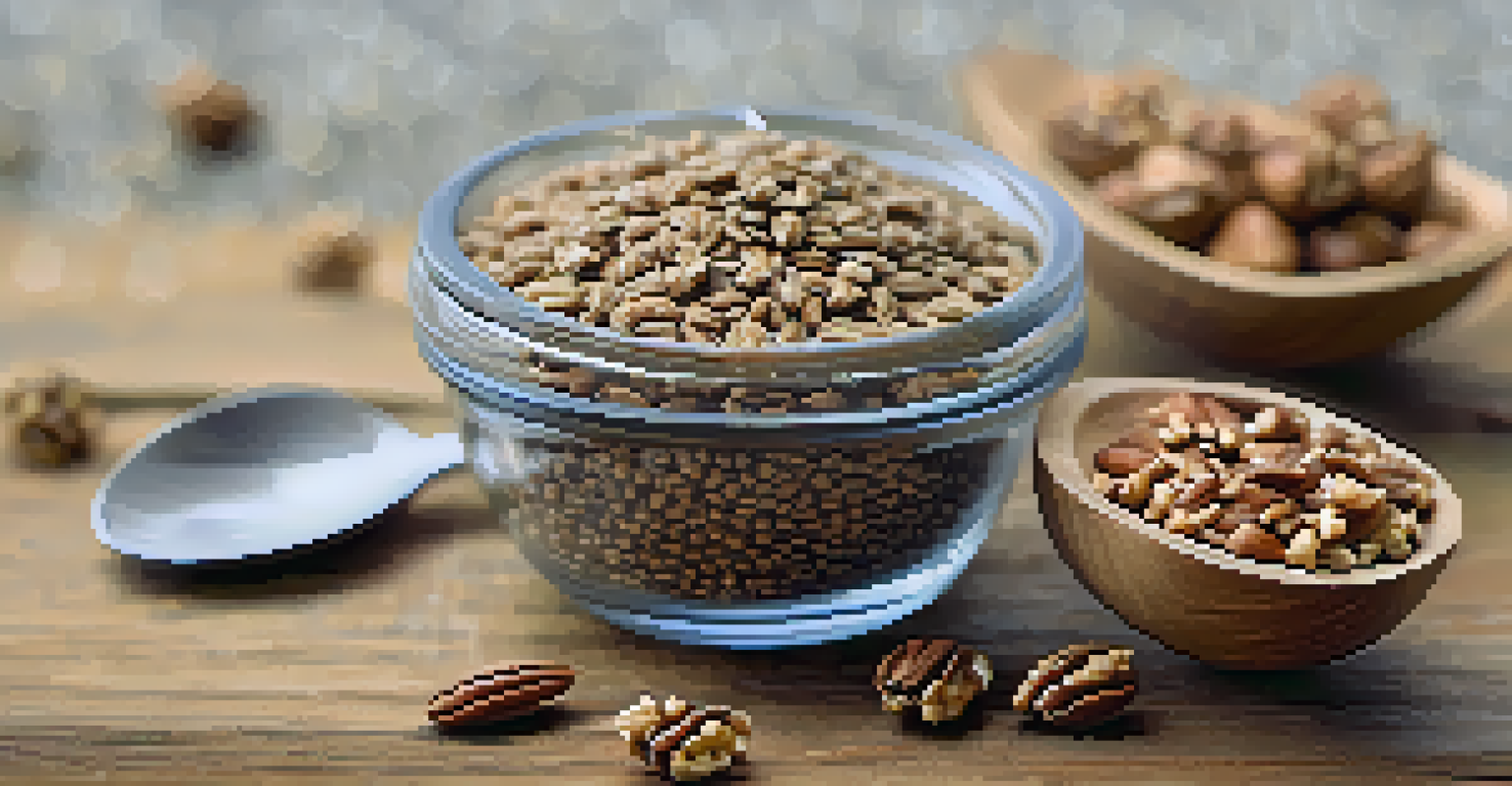Omega-3 Fatty Acids in Raw Foods for Cognitive Health

What Are Omega-3 Fatty Acids and Why They Matter
Omega-3 fatty acids are essential fats that our bodies can't produce on their own, meaning we must obtain them through our diet. They play a crucial role in brain function, making up a significant part of our brain's structure. Think of them as building blocks for your neurons, helping them communicate effectively.
The brain is a world consisting of a number of unexplored continents and great oceans of the mind; time and patience are needed to traverse them.
There are three main types of omega-3s: ALA (alpha-linolenic acid), EPA (eicosapentaenoic acid), and DHA (docosahexaenoic acid). ALA is primarily found in plant-based sources, while EPA and DHA are abundant in fish. Including a variety of these omega-3s in your diet can have profound effects on cognitive health.
Research indicates that omega-3s may help reduce the risk of cognitive decline and improve mood. So, by consciously incorporating these nutrients into your meals, you're not just satisfying your hunger but also nurturing your brain.
Raw Foods: A Rich Source of Omega-3s
When we think of omega-3 fatty acids, fish often comes to mind. However, many raw foods are fantastic sources of ALA, the plant-based omega-3. Flaxseeds, chia seeds, and walnuts are prime examples of raw foods that pack a powerful omega-3 punch.

Incorporating these raw foods into your diet can be easy and delicious. For instance, adding flaxseeds to your morning smoothie or sprinkling chia seeds over your yogurt not only enhances flavor but also boosts your omega-3 intake. It’s a simple way to support cognitive health without drastically changing your eating habits.
Omega-3s are Essential for Brain Health
Omega-3 fatty acids play a crucial role in cognitive function and must be obtained through diet.
Moreover, consuming raw foods often retains more nutrients compared to cooked options. This means that by choosing raw sources of omega-3s, you're getting the maximum health benefits, all while enjoying fresh, vibrant flavors.
The Cognitive Benefits of Omega-3 Fatty Acids
Omega-3 fatty acids have been linked to numerous cognitive benefits, including improved memory and concentration. They help maintain the integrity of brain cells, which is essential for effective communication between neurons. This is particularly important as we age, as cognitive decline can become more pronounced.
Eating food is a form of self-respect.
Studies suggest that individuals who consume higher amounts of omega-3s tend to have better cognitive function. For example, a diet rich in these essential fats may be associated with a lower risk of Alzheimer’s disease and other forms of dementia. It’s like giving your brain the nutrients it needs to stay sharp.
Incorporating omega-3s into your daily routine can be as simple as snacking on walnuts or adding a sprinkle of chia seeds to your meals. By making these small changes, you’re not just eating well; you’re also investing in your brain health.
How to Incorporate Raw Omega-3s into Your Diet
Incorporating raw omega-3 sources into your diet doesn’t have to be complicated. Start by adding a tablespoon of ground flaxseed to your oatmeal or smoothie. This small change can significantly increase your ALA intake and kickstart your day with a brain boost.
Another easy option is to snack on raw walnuts throughout the day. They’re not only tasty but also portable, making them a great choice for on-the-go nutrition. You can also use them in salads or as a topping for yogurt to add crunch and flavor.
Raw Foods Boost Omega-3 Intake
Incorporating raw sources like flaxseeds and walnuts can significantly enhance your omega-3 intake.
Additionally, consider making chia pudding as a delicious treat. Just mix chia seeds with your favorite milk alternative, let it sit, and you’ll have a nutritious snack rich in omega-3s. It’s a fun and creative way to enjoy the benefits of these essential fatty acids.
Other Nutrients That Support Cognitive Health
While omega-3s are vital for cognitive health, they work best in conjunction with other nutrients. Antioxidants, found in colorful fruits and vegetables, help protect brain cells from oxidative stress. Think of them as the bodyguards for your neurons, keeping them safe from damage.
B vitamins, particularly B6, B12, and folate, are also essential for brain health. These vitamins play a role in energy production and help with the formation of neurotransmitters, which are critical for mood regulation and cognitive function. Incorporating foods rich in these nutrients will create a well-rounded approach to supporting your brain.
By focusing on a varied diet that includes omega-3s, antioxidants, and B vitamins, you create a strong foundation for cognitive health. It’s about building a balanced plate that fuels your brain, helping it to thrive.
The Importance of a Balanced Diet for Brain Health
A balanced diet is crucial for optimal brain function, and omega-3 fatty acids are just one piece of the puzzle. Including a variety of whole foods—fruits, vegetables, whole grains, and lean proteins—ensures that your brain gets all the nutrients it needs to operate at its best. Think of your diet as a colorful palette; the more diverse the colors, the more vibrant the picture.
When you prioritize whole, nutrient-dense foods, you’re not only enhancing cognitive function but also supporting overall health. Limiting processed foods and sugars can help reduce inflammation, which has been linked to cognitive decline. This means that making mindful choices in your diet can lead to a healthier brain and body.
Balanced Diet Supports Cognitive Function
A varied diet rich in omega-3s, antioxidants, and B vitamins provides a strong foundation for brain health.
Remember, it’s not just about one magical food; it’s about creating a lifestyle that supports your well-being. By embracing a balanced diet rich in omega-3s and other essential nutrients, you pave the way for long-term cognitive health.
Conclusion: Nourish Your Brain with Omega-3s
In conclusion, omega-3 fatty acids found in raw foods offer significant benefits for cognitive health. By understanding their importance and incorporating them into your daily diet, you can support your brain and enhance your overall well-being. It’s a small but impactful step towards a healthier lifestyle.
From flaxseeds to walnuts, there are numerous ways to enjoy these nutrient-rich foods. The beauty of raw food sources is that they are versatile and easy to integrate into various meals and snacks. You can get creative in the kitchen and discover new flavors while boosting your health.

So, why not start today? Make a conscious effort to add more omega-3s to your diet, and watch as you nourish your brain with every bite. Your future self will thank you for it!